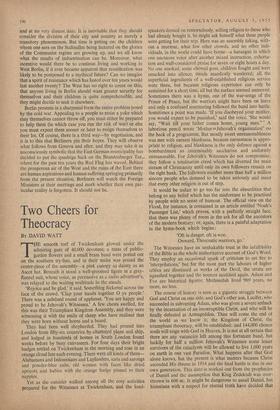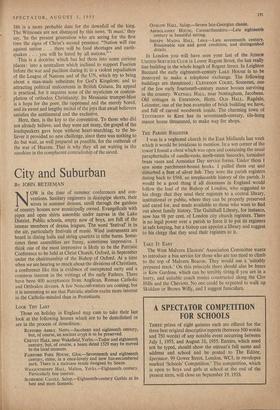Two Cheers for Theocracy
BY DAVID WATT THE smooth turf of Twickenham glowed under the admiring gaze of 40,000 devotees; a mass of public- garden flowers and a small brass band were potted out on the southern try-line, and in their midst was poised the centre-piece of the assembly—a pink canopy as dainty as an Ascot hat. Beneath it stood a well-groomed figure in a grey- flannel suit, whose voice, as persuasive as a radio advertiser's, was relayed to the waiting multitude in the stands.
`Rejoice and be glad,' it said. Something flickered across the face of the crowd. 'Clap your hands together 0 ye people.' There was a subdued round of applause. 'You are happy and proud to be Jehovah's Witnesses.' A few chests swelled, for this was their Triumphant Kingdom Assembly, and they were witnessing it with the smile of sheep who have realised that they were born without horns and a beard.
They had been well shepherded. They had poured into London from fifty-six countries by chartered plane and-ship, and lodged in hundreds of homes in South London found weeks before by busy canvassers. For four days their bright badges settled on Twickenham in the morning and rose in an orange cloud late each evening. There were all kinds of them- Alabamans and Indonesians and Laplanders, saris and sarongs and powder-blue suits, old women with faces like dried. apricots and babies with the orange badge pinned to their nappies.
Yet as the outsider walked among all the cosy activities prepared for the Witnesses at Twickenham, and the loud- speakers droned on remorselessly, selling religion to those who had already bought it, he might ask himself what these people were getting for their trip. Here was an assembly taking, with- out a murmur, what few other crowds, and no other indi- viduals, in the world could have borne—a harangue in which one unctuous voice after another mixed instruction, exhorta- tion and well-considered praise for seven or eight hours a day. No one smoked, some chewed gum, children fought and were smacked into silence, minds manifestly wandered; all the superficial ingredients of a well-established religious service were there, but because religious experience can only be sustained for a short time, all but the surface seemed unmoved. Sometimes there was a hymn, one of the war-songs of the Prince of Peace, but the warriors might have been on leave and only a confused murmuring followed the band into battle. Sometimes a point was made. 'If you disobeyed your mother, you would expect to be punished,' said the voice. 'She would say, "Wait till your father comes home, young man." ' A laborious pencil wrote `Mother=Jehovah's organisation' on the back of a programme. But mostly sweet unreasonableness was met with earnest blankness, because earnestness is appro- priate to religion, and blankness is the only defence against a bombardment so interminably saccharine and uniformly unreasonable. For Jehovah's Witnesses do not compromise; they follow a totalitarian creed which has diverted the main stream of Christianity until only its own followers remain on the right bank. The followers number more than half a million sincere people who demand to be taken seriously and insist that every other religion is out of step.
It would be unfair to go too far into the absurdities that belong to any belief which has the misfortune to be practised by people with no sense of humour. The official view on the Flood, for instance, is contained in an article entitled 'Noah's Passenger List,' which proves, with a perfectly straight face, that there was plenty of room in the ark for all the ancestors of'the modern bestiary; or, again, there is a painful adaptation in the hymn-book which begins : `Oft in danger, oft in woe, Onward, Theocratic warriors, go.'
The Witnesses have an unshakable trust in the infallibility of the Bible as the whole authoritative account of God's Word. They employ an occasional spark of criticism to set fire to `interpolations,' but for the most part the labours of higher critics are dismissed as works of the Devil, the strata are squashed together and the sources muddied again. Adam and Eve are historical figures; Methuselah lived 969 years, no more, no less.
The course of history is seen as a gigantic struggle between God and Christ on one side, and God's other son, Lucifer, who succeeded in subverting Adam, who was given a severe setback by the incarnation of an incorruptible Christ, and who will be finally defeated at Armageddon. Then will come the end of the world as we know it; the Kingdom of Christ. the triumphant theocracy, will he established; and 144,000 chosen souls will reign with God in Heaven. It is not at all certain that there are any vacancies left among this fortunate band, but luckily for half a million Jehovah's Witnesses some lesser survivors of the cataclysm will be allowed to live 1,000 years on earth in one vast Paradise. What happens after that God alone knows, but the present is what matters because Christ ascended His throne in 1.914 and the final battle is due in our own generation. This date \is worked out from the prophecies of Daniel and the assumption that King Zedekiah was over- thrown in 606 BC. It might be dangerous to assail Daniel, but historians with a respect for eternal truth have decided that 586 is a more probable date for the downfall of the king. The Witnesses are not dismayed by this news. 'It must,' they say, 'be the present generation who are seeing for the first time the signs of Christ's second presence. "Nation will rise against nation . . . there will be food shortages and earth- quakes . . . you will be hated by all nations."' This is a doctrine which has led them into some curious places : into a neutralism which inclined to support Fascism before the war and pacifism during it; to a violent repudiation of the League of Nations and of the UN, which try to bring about a man-made substitute for God's Kingdom; and to attracting political malcontents in British Guiana. Its appeal is practical, for it requires none of the mysticism or contem- plation of orthodox Christianity. Its Messianic trumpet-blast is a hope for the poor, the oppressed and the merely bored, and its sweet and lengthy recital of the joys that await believers satisfies the sentimental and the exclusive.
Here, then, is the key to the convention. To those who did not already believe, and they were not many, the gospel of the loudspeakers gave hope without heart-searching; to the be- liever it provided no new challenge, since there was nothing to do but wait, as well prepared as possible, for the outbreak of the war of Heaven. That is why they all sat waiting in the sunshine in the complacent comradeship of the saved.



































 Previous page
Previous page